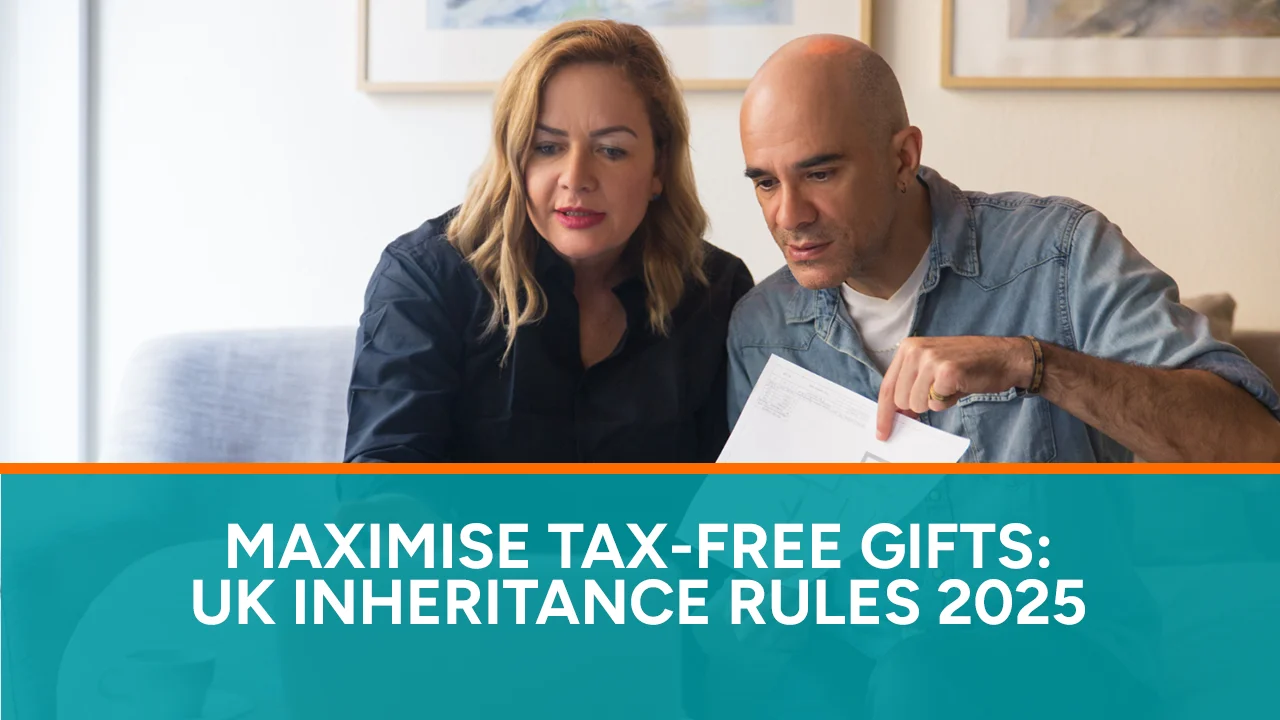In early 2025, inheritance tax rules in the UK are important for anyone wanting to protect their estate and secure their family’s future. These rules are complex and changing, so planning ahead is essential.
Why 2025 Is Important for Gift Planning
This year is crucial because many tax exemptions are being reviewed, and HMRC is increasing enforcement. Small businesses, landlords, and households must pay attention to the new inheritance tax rules if they want to give gifts without facing extra taxes. With the right timing and advice, you can plan your gifts legally and efficiently. For those dealing with wealth transfers between generations, 2025 is a chance to rethink gifting strategies and make the most of available reliefs before any new rules are introduced.
What Is the UK Gift Allowance 2025?
The first step to lowering your inheritance tax is knowing your UK gift allowance for 2025. Each person in the UK can give away up to £3,000 each tax year without paying inheritance tax. This is called the annual exemption.
If you don’t use your full allowance, you can carry over the unused amount to the next year, allowing for a possible £6,000 tax-free gift. It’s important for families, especially business owners and wealthy individuals, to take advantage of this allowance before the fiscal year ends to avoid inheritance tax in 2025. Parents and grandparents can also combine their exemptions, providing significant support to future generations while reducing their estate’s taxable value.
Knowing how this allowance works helps you make the most of it. For example, if both parents gift £3,000 each, they can transfer £6,000 in one tax year. If they didn’t use their exemption from the previous year, they could potentially give away up to £12,000 without any inheritance tax. This tax-free giving can greatly benefit your loved ones and keep your estate more tax-efficient.
How to Avoid Inheritance Tax Through Gifting
Many people wonder how to avoid inheritance tax through gifting. The key is smart financial planning, starting with small exempt gifts. For example, giving multiple £250 gifts to different people each year can add up to a significant amount that is free from inheritance tax. You can give these gifts to family members, friends, or even employees.
Wedding gifts also have exemptions: you can give £5,000 to your children or £2,500 to your grandchildren without incurring tax. These policies help lower your taxable estate while supporting loved ones now. It’s not just about being generous; it’s about being smart with your generosity. By planning these gifts ahead of time, you can build goodwill and keep your estate under the inheritance tax threshold for 2025.
For small business owners, giving shares or assets that may increase in value later is another smart way to avoid inheritance tax, as long as these gifts meet the necessary criteria and are properly documented. It’s important to get professional advice in these situations to avoid breaking complex inheritance tax rules in the UK.
Demystifying the Seven-Year Rule Inheritance Tax UK
Many people misunderstand the UK inheritance tax rules, especially the seven-year rule. This rule says that gifts made more than seven years before death are not taxed. If used properly, it can help lower inheritance tax bills.
If you die within seven years of giving a large gift, that gift might be taxed. However, taper relief can lessen the tax amount. The longer you live after giving the gift, the less tax your heirs will pay. Gifts given three to seven years before death have a gradually decreasing tax rate due to taper relief. This strategy is a powerful way to plan gifts but is often not used enough by families.
To use this rule effectively, keep detailed records. Note the gift’s date, value, and who received it. This careful record-keeping helps protect executors and heirs from disputes or investigations by HMRC. Planning large gifts wisely, perhaps by using annual allowances over several years, can reduce risks and improve tax results.
Inheritance Tax Threshold UK 2025 Explained
In 2025, the UK inheritance tax threshold is £325,000 for individuals. Anything over this amount is taxed at 40%. If you leave your home to your children or grandchildren, you can add an extra property allowance of £175,000, called the residence nil-rate band.
This means married couples or civil partners can pass on up to £1 million without paying inheritance tax, as long as all allowances are used correctly. However, if you own property in the South East, run a business, or have investment assets, it’s easy to go over these limits.
Tax planning for gifts and organising your estate is important in these situations. Using trusts, staggered gifts, or lifetime transfers can help you pass on your wealth with minimal loss. It’s also vital to regularly check your will and estate documents to make sure they follow current laws and reflect your financial situation.
Exempt Gifts UK Inheritance Tax Rules You Should Know
In addition to annual allowances, the UK has other gifts that are exempt from inheritance tax (IHT). Gifts between spouses or civil partners are completely tax-free, no matter the amount. This allows couples to transfer assets during their lives or after death without worrying about IHT.
Regular payments made from extra income, like monthly savings given to a child, are also tax-exempt. These payments must be regular, well-documented, and not affect your usual lifestyle. Documentation is crucial; you need to prove that these payments are part of your normal financial routine. Clarkwell & Co.’s Inheritance Tax Advice Accountants can help with compliance and clarity.
Many people ignore surplus income gifts because they think only large sums matter. However, a smart plan with regular, smaller transfers can be just as effective over time. This exemption is especially useful for those with steady pensions or rental income.
Mistakes That Can Trigger Unexpected Tax Bills
Many people unintentionally break UK inheritance tax rules, even when they mean well. A common mistake is giving away property without thinking about the seven-year rule. If you live in that property without paying market rent, HMRC may see it as a “gift with reservation of benefit,” meaning it still counts as part of your estate.
Another mistake is not properly documenting financial gifts or misunderstanding who is eligible for exemptions. For instance, using the same person for both the small gifts and wedding gift allowances can cancel out the tax benefits. Property Tax Accountants in London can help property owners avoid issues like unclaimed allowances or misclassified gifts.
People also make mistakes by not updating their estate plans regularly. Changes in family situations, asset values, or tax laws can make old strategies ineffective. Having professionals review your gifting and estate plans regularly can provide peace of mind and clear financial insights.
How Clarkwell & Co. Can Help You Stay Compliant
Clarkwell & Co. Chartered Certified Accountants in London have years of experience helping clients with UK inheritance tax. Our team provides clear advice and keeps your estate compliant with the latest laws.
Whether you’re a homeowner, small business owner, or landlord, our HMRC Investigation Service in London helps you avoid fines and audits. We make tax planning simple and effective. We review your past gifts and help you plan future ones efficiently.
As the government digitises tax systems and shares data, having experts on your side is crucial. Our complete service covers everything from inheritance tax planning to property tax strategies, ensuring nothing gets overlooked.
The Road Ahead – Planning Today for Peace Tomorrow
It’s never too early to start planning. By knowing your UK gift allowance for 2025, using the seven-year rule for inheritance tax, and applying exempt gift strategies, you can lessen future tax burdens and benefit your family.
Tax laws change, so it’s important to stay informed. With Clarkwell & Co., you can trust your decisions, whether you’re gifting your child a home deposit or transferring business shares. Avoid inheritance tax not by hiding assets but by using smart, clear planning. Your future self and your beneficiaries will appreciate it.
If you’re unsure where to start or want to check if your gifting strategy follows current laws, talk to an expert. At Clarkwell & Co., we provide thorough reviews, proactive advice, and personalised support tailored to your estate’s needs.







